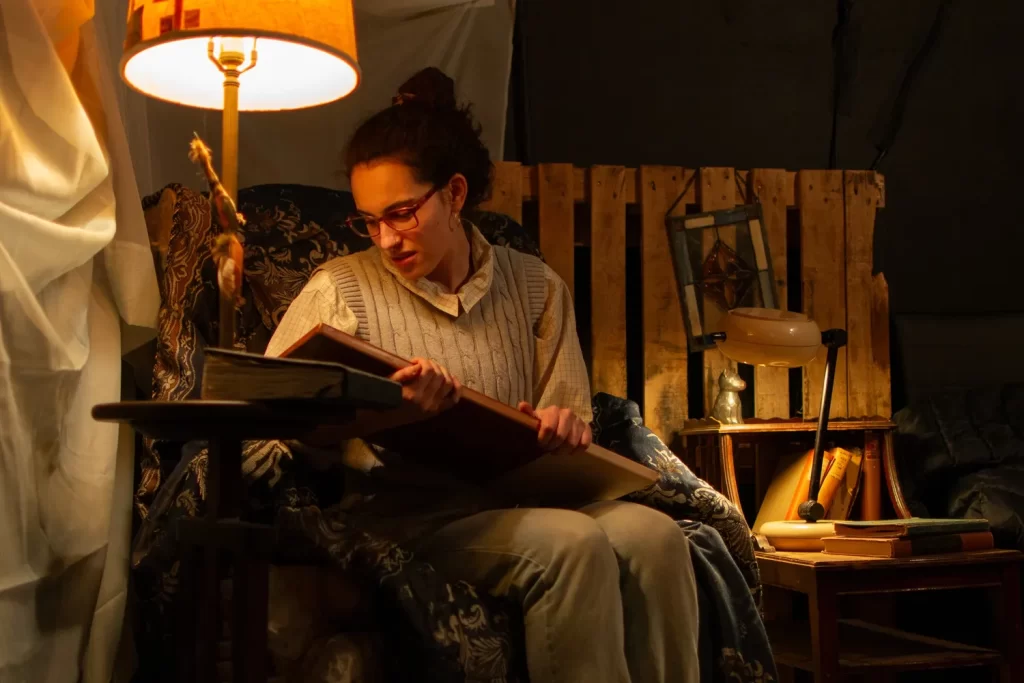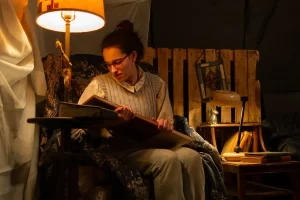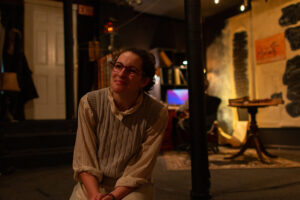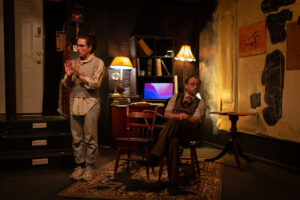
 ** Despite an attention-grabbing title, an interesting premise, and fine acting, “The Berlin Diaries” is a disappointment. The play is hopelessly confusing, with too much distance between the characters and the audience. The question is whether the original script is muddled or whether the fault lies in how this production was put together—or both.
** Despite an attention-grabbing title, an interesting premise, and fine acting, “The Berlin Diaries” is a disappointment. The play is hopelessly confusing, with too much distance between the characters and the audience. The question is whether the original script is muddled or whether the fault lies in how this production was put together—or both.
This is an autobiographical story about playwright Andrea Stolowitz. The play details her quest to find extended family members who might have perished in the Holocaust. Not only does she want to understand who these relatives were, but she also has the goal of writing a play about the process of finding them. Andrea has inherited a diary that once belonged to her great-grandfather Max Cohnreich, a Jewish doctor who lived in Berlin, Germany, before World War II. After putting the diary aside for many years, Andrea has decided to research the history and whereabouts of her family using her great-grandfather’s text as a guide. She subsequently does some online searches using records from the U.S. Holocaust Museum and then goes to Germany to examine records at the Jewish Museum Berlin. Although Andrea initially presumes that most of her relatives probably died in the concentration camps, it turns out that a lot of these people escaped the Nazis. Soon she comes to realize that many of their progeny may still be around today, albeit scattered in various countries throughout the globe.
But the show is not without its problems.
It is a major mistake to have only two performing artists play so many numerous and sundry characters. Even though Eliana Deckner-Glick and Artem Kreimer skillfully change their accents and their demeanor to distinguish one character from another, the audience can’t always keep the characters straight or follow them as well as we should. Plus we constantly watch the actors rotate roles: both of them play Andrea; both of them play Max; both play Andrea’s mother and other relatives and even an archivist or two. On occasion, they play Andrea at the same time, posing as her ego and her alter ego. We often don’t know which Andrea character persists into the next scene, the one being acted by Deckner-Glick or the one being acted by Kreimer. And after awhile, it becomes impossible to keep track of how and when each of the actors morph from one character into the next—or morph into each other.
When the actors keep switching roles, we can’t always follow the progression of the show or visualize how one scene transitions into the next. So we don’t know where the action is taking us. I wasn’t always sure if certain scenes were happening contemporaneously or whether they were happening in the past or whether there was some smush of past and present. To assist us, there is some modicum of projection design, which is done rather creatively on the monitor of a desktop computer, located in a far corner of the room. While the display gives us some idea about where the action takes place, it does not make up for the fact that the scenes nonetheless get confusing. Then I got mixed up about the different generations of Max’s grandchildren and great-grandchildren (namely, Andrea’s cousins). For example, I’m still trying to figure out where Clara fits in and how Max is related to Flora. Even the quotations from Max’s diary are excerpted out of chronological order. In the end, we are left with a huge tangle of a family tree, which apparently Andrea has figured out—but not necessarily the audience.
There needs to be more of a hook to engage our interest than just Andrea’s curiosity about her roots. Ideally, her ancestors and extended family members ought to serve as examples of the Jews who once lived in Berlin and who were probably assimilated into German culture. Their life stories should inform us about what could have happened to any one of us had we lived in Germany during the 1930s and 1940s once Hitler came to power. What sorts of discrimination did they experience? What terrors were they subject to? How were some able to get out of Germany pronto? And why were others not so lucky? Whether we in the audience are Jewish or not, we need to relate to these people and see how they might touch our own lives and speak to something about ourselves. Instead, the script pulls us in the wrong direction: The audience really doesn’t care about the exact relationship between this cousin and that one—or precisely which street Relative X once lived on or whether they moved down the street or not. It really doesn’t matter if Andrea found six “lost” people or sixty. The names are incidental. We’re not going to remember them anyway. It’s their intricate descriptions that we need to hear.
Plus Andrea is not a very compelling character to follow in the first place. Her emphasis on the process of doing research is much too cold and clinical. Her self-absorption eclipses any warmth or fellow-feeling for most of the relatives described in this play. The only character who is somewhat developed is that of Max, who writes in his diary and constantly reads from it. In the end, it is no surprise to the audience that the show is entitled “The Berlin Diaries.” Max apparently kept more than one written account of his life. Apparently, Andrea acquired the copy from Germany that preceded the Holocaust and World War II, while Max continues to write in another diary which he has kept with him while living in New York after emigrating to the United States in 1939. It is in this second diary that he expresses his hope that his great-grandchildren will read what he has to say.*
The production takes place in a small storefront theatre where the stage is an English basement. On the long wall is a drawing of a family tree, plus an atlas cover that says “Berlin.” There are also a number of chalkboard “blobs”, which are gradually uncovered to reveal more and more names of relatives who have been found. Connections are literally made with strings and push pins between names and locales. In a corner opposite the wall is an easy chair where Max does his writing. Unfortunately, the audience has to rely too much on imagining other scenes and locales independent of the projection design. Then there’s the twenty or so seats for the audience, consisting of regular chairs in the front row and bar height chairs in the back row. These high chairs weren’t comfortable at all, although they worked okay initially and allowed us in the back to see the action without someone else’s head interfering with our view. However, it becomes difficult to sit on these chairs for all of 90 minutes, since your feet touch the chair’s railing but are never firmly planted on the floor.
It’s hard to pinpoint the worst fault in this show: whether it be the two-actor script or the fact that the story overemphasizes Andrea’s feelings and actions. Above all, the narrative should have delineated more of the experiences of the people who lived through the terrible events in Germany and who can give us the clearest view of what happened in their own words. The show should have tugged at our heartstrings, and we should have been sitting on the edge of our seats (without falling off the bar stools). I can certainly relate to the quest of learning more about the histories of those who once fled from the Nazis; I’ve done some of this research myself, up close and personal. Perhaps that’s why I was all the more frustrated with the seeming superficiality of this story and the nonchalance of its approach.
“The Berlin Diaries” is directed by Izadorius Tortuga and produced by Arts Judaica in collaboration with Open Space Arts. It is playing through January 5, 2025, at Open Space Arts, 1411 W. Wilson Avenue, Chicago.
 General admission tickets – $25
General admission tickets – $25
Seniors and students – $20
OSA members – $15
Performance schedule:
Fridays and Saturdays at 7:30 p.m.
Sundays at 2:00 p.m.
For more information about this show, see: https://openspacearts.org/the-berlin-diaries.
To purchase tickets, visit: https://www.goelevent.com/OpenSpaceArts/e/TheBerlinDiaries.
For general information and a list of their other offerings, see: https://openspacearts.org/.
*Important note: This play was originally called “Berlin Diary.” Had this been the title of the show, the audience would not have been clued into the fact that Max had created more than one volume.
To see what others are saying, visit www.theatreinchicago.com, go to Review Round-Up and click at “The Berlin Diaries”.






More Stories
“The Firebugs” reviewed by Julia W. Rath
“The Book of Grace” Al Bresloff with another from Paul LIsnek
“The Last Five Years” MILWAUKEE